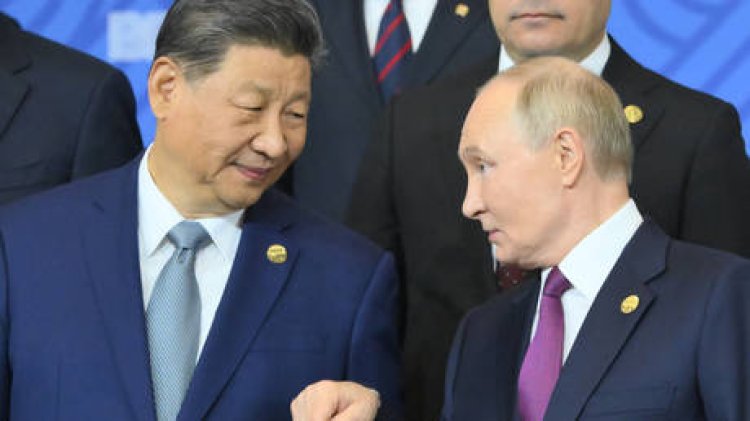Fyodor Lukyanov Claims the West Has Lost Its Leadership – Exploring the Consequences
<b>Russia, China, and the US Form a Strategic Triangle of Power</b> The United States continues to maintain a dominant position in global affairs. Its vast influence—political, military, economic, and cultural—is the result of a significant...

The United States continues to maintain a dominant position in global affairs. Its vast influence—political, military, economic, and cultural—is the result of a significant historical advantage established over many decades. It would take an extraordinary event, akin to the collapse of the Soviet Union, to potentially displace Washington from its status as a leading global power, a scenario that currently appears improbable.
However, there is a noticeable shift in how the US perceives its role in the world. American leaders are increasingly acknowledging the rise of a multipolar world. Figures like Senator Marco Rubio have begun to speak about it openly. Washington still views itself as the most powerful player, but it no longer sees itself as the sole hegemon. The age of unchecked dominance has evolved into a new reality in which power is recognized as shared rather than concentrated.
The concept of "multipolarity" entered international discussions in the mid-1990s, largely as a reaction against Western triumphalism. After the Cold War, the prevailing narrative among America and its allies was that the liberal world order was the only viable system. Multipolarity, advocate prominently by Russia and China, emerged as a response—a more rhetorical stance than a well-crafted strategy at the time, but nevertheless a vital expression of intent.
In the 1990s, the political West had a significant lead across nearly every arena, including economic power, military reach, ideological influence, and cultural exports. The only area where it fell behind was demographics. Western nations constituted a small fraction of the global population, but their substantial advantages in other realms made this demographic imbalance seem inconsequential.
This assumption has proven to be flawed. Today, we recognize that demographics—previously underestimated—are key to numerous challenges confronting the developed world. Migration has emerged as a defining issue, with large movements of people from the Global South to the Global North reshaping societal and economic structures. This influx creates internal stresses within host nations, leading to political crises, while simultaneously serving as an essential source of labor for aging, diminishing populations.
This complex dynamic carries geopolitical implications. On one hand, countries that send migrants gain unexpected leverage over more powerful nations, despite their continued reliance on remittances and goodwill from their host countries. On the flip side, restrictive measures from host nations can incite turmoil in migrants' countries of origin—creating instability that could reverberate back to the West. Migration has evolved beyond a solely domestic or humanitarian issue; it is now integral to the global balance of power.
As the world moves toward greater multipolarity, another crucial trend becomes evident: not all aspiring powers are keen to participate in global competition. Ongoing crises in Ukraine and Palestine have highlighted the limited number of actors willing to take significant geopolitical risks. Once again, it is the United States and Russia—the 20th-century superpowers—that are primarily defining outcomes in these vital areas: Eastern Europe and the Middle East.
While their relative power dynamics may have shifted, what matters is not just capability but also the commitment to engage in the "big game"—to embrace responsibility, accept risks, and act with decisiveness. This is where many states in the so-called Global South, including major powers like India, have shown restraint. A multitude of these nations tends to observe, strategize, and act selectively based on their own interests. Their demographic prominence offers them long-term influence, but they currently remain cautious participants.
Simultaneously, a new strategic triangle has emerged, consisting of Washington, Moscow, and Beijing. Two of these powers—Russia and the US—are deeply enmeshed in shaping contemporary global dynamics. The third, China, wields considerable influence through its economic and industrial capabilities but is typically reluctant to engage in direct political conflicts. Nevertheless, Beijing recognizes that it cannot afford to remain aloof indefinitely. Its role in determining the future is far too significant to overlook.
In contrast, Western Europe finds itself in an increasingly precarious position. The European Union aspires to be a player in global decision-making but lacks the necessary tools to assert itself. Its military capabilities are limited, political cohesion is fragile, and its economic advantages are waning. Consequently, the EU risks becoming more of an object than a subject in global transformation—a realization that contributes to its erratic and short-sighted foreign policy actions.
The triangle encompassing Washington, Moscow, and Beijing is not fixed; it is subject to change. India, due to its size and ambition, and Western Europe, because of its proximity to numerous crises, will remain significant players. Other regional actors—such as Turkey, Saudi Arabia, Iran, Israel, and US allies in East Asia—also have roles to fulfill. However, the foundation of today’s global configuration is anchored at three vertices, each adopting a distinct approach to power.
Thus, multipolarity as it currently manifests in April 2025 is not a neat equilibrium among equals, but rather a dynamic and evolving structure shaped by ambition, foresight, legacy, and demographics. By the end of the year, this landscape may already have transformed significantly.
Anna Muller for TROIB News
Find more stories on Business, Economy and Finance in TROIB business












